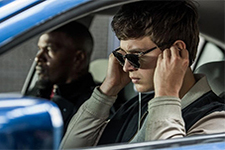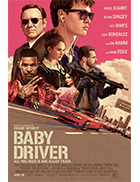Baby Driver
|

There is a refreshing simplicity to Edgar Wright's Baby Driver, which is not something one can usually say about his films. Ever since his breakthrough horror-comedy Shaun of the Dead (2004), which introduced the world to Simon Pegg and helped invigorate a new cottage industry in postmodern zombie movies, Wright has delighted in toying with, subverting, and in some cases completely upending beloved Hollywood genres, but always with the sensibility of a kid who loves the toys he's breaking (that sensibility apparently was too much for Marvel, which sent him packing from Ant-Man several years ago). His best films, which also include the buddy-cop parody Hot Fuzz (2007) and the multimedia action-fest Scott Pilgrim vs. the World (2012), manage to defy convention while also holding fast to some basic emotional tenets—male camaraderie in the former and romance in the latter. Sometimes he goes for too much, as in the recent The World's End (2014), which unsuccessfully tried to marry an ale-soaked buddy reunion comedy with an end-of-the-world alien invasion plot, but you can't fault his ambition and resolve. In many ways, Baby Driver feels like a scaled-down Edgar Wright film, and that might not be a bad thing. It is, like his other films, driven by a carefully chosen soundtrack of classic rock, R&B, and hip-hop, although now we have a built-in explanation for the music: The titular Baby (Ansel Elgort), a twentysomething getaway driver with mad skills behind the wheel, was in a car accident as a child that left him orphaned and with a "hum in the drum," as one character puts it, which he drowns out with music from his plethora of earbuds. He carries multiple iPods with him at all times, each one loaded with a different mix of music for different occasions, and the conceit genuinely works in terms of both nostalgia (How cute! A little box that only plays music!) and character, as it adds to his sense of isolation from the criminal enterprise in which he is engaged. A reluctant criminal, Baby drives getaway for bank robbers not for the money, but because he is indebted to Doc (Kevin Spacey), the well-heeled mastermind who brings together various crews to pull off daring heists of his design. Baby made the mistake of stealing one of Doc's cars several years earlier and pitching the valuable contents therein, which put him deep in Doc's debt, and he's been driving it off ever since. We know that Baby is a fundamentally good person because, first of all, he is played by Ansel Elgort (The Fault in Our Stars), which means he looks like a fresh-scrubbed high school student on his way to his next honors class. We also know he's good because he doesn't consort with the motley crew of violent criminals Doc assembles (played by the sneering likes of Jaime Foxx, Jon Hamm, Eiza González, Flea, Lanny Joon, and Jon Bernthal). But, mostly he displays his fundamental decency in both his taking care of his aging, wheel-chair-bound, and stone-deaf foster dad (CJ Jones) for whom he makes peanut-butter sandwiches and speaks in sign language and his poignant crush on Debora (Lily James), the bright-eyed waitress who works at his favorite diner. Baby is something of an affable goofball, which se see via his complete immersion in his music as he walks the mean streets of Atlanta, lost in his own lively dance moves as if he were living in a musical of his own creation. Thus, it isn't surprising that Debora is keen on him and they end up in a romance whose genuine sweetness and surprising chasteness plays quite the counterpart to the violent action. And, really, the action is where Wright's film shines, as he puts the full pedal to the metal in returning us to the old-fashioned delights of real car chases through real streets with real cars doing seemingly impossible moves. Wright has always had one foot in the past and one in the future, and here he brings back the giddy thrills of a grittier era in Hollywood cinema that saw Steve McQueen tearing through San Francisco in Bullitt (1968) and Gene Hackman barreling through Chicago in The French Connection (1971). Much of the exhilaration is conveyed in the editing, but Wright makes sure that we see how this is all the real deal and not a lot of digital trickery; he essentially picks up where the Fast and the Furious franchise left off when it abandoned all sense of realism in favor of over-the-top CGI ridiculousness. (It also helps that Wright has a devious sense of humor, and he works in all kinds of visual and verbal gags throughout the film, which makes the action feel light without being inconsequential.) The car chases in Baby Driver are thrilling primarily because we can believe in them on some level; watching Baby slamming the various getaway cars into different gears, pumping the breaks, and jerking the wheel, all while remaining a steely-calm rock of sunglasses-wearing cool turns the film into less of a crime thriller than the ultimate Revenge of the Nerd. Alas, Wright does end up pushing things a bit too far in the final third when he concocts a subplot that pits Baby again Jon Hamm's Buddy, who is intent on revenge-killing him in the worst way. Perhaps while writing the script Wright starting watching too many slasher films, because the way Buddy refuses to stay dead and keeps on coming is enough to make one think that Wright is on the verge of diving back into the horror genre again. Copyright © 2017 James Kendrick Thoughts? E-mail James Kendrick All images copyright © Sony Pictures / TriStar |
Overall Rating:



 (3.5)
(3.5)
Subscribe and Follow
Get a daily dose of Africa Leader news through our daily email, its complimentary and keeps you fully up to date with world and business news as well.
News RELEASES
Publish news of your business, community or sports group, personnel appointments, major event and more by submitting a news release to Africa Leader.
More Information
